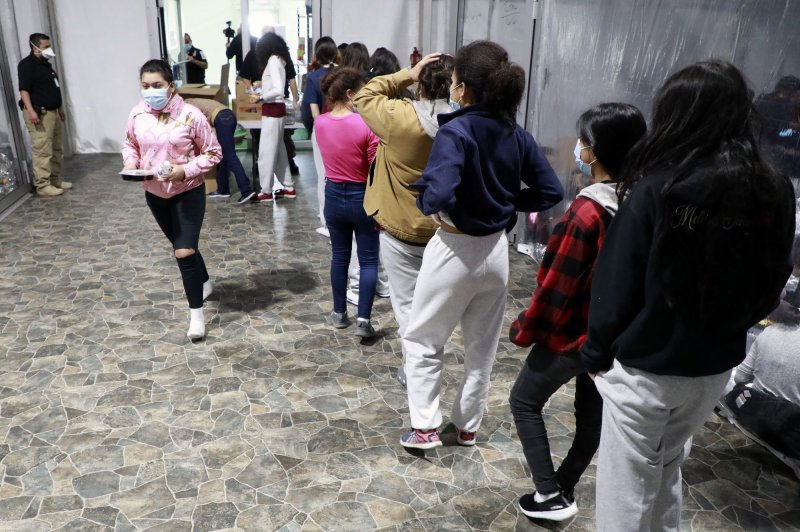1 of 7 | A temporary U.S. Customs and Border Protection processing facility is seen in Donna, Texas, on February 25. The facility aims to process family units and unaccompanied children in federal custody and handle migrants in the Rio Grande Valley until the permanent Centralized Processing Center in McAllen is renovated. File Photo by Jaime Rodriguez Sr./CBP/UPI |
License Photo
April 27 (UPI) -- Congress on Tuesday heard testimony from experts about how the United States can better handle unaccompanied migrant children at the border, following an influx of arrivals this year.
The hearing titled "Unaccompanied Children at the Border: Stakeholder Perspectives on the Way Forward" sought to give the members of the homeland security subcommittee on border security, facilitation and operations the opportunity to "examine suggestions for improving our system for unaccompanied children."
Last month, thousands of unaccompanied minors were reported to be under federal care, with many being held at U.S. Customs and Border Protection facilities beyond the 72-hour limit set by federal law.
In her opening statement, subcommittee Chairwoman Nanette Barragan, D-Calif., said that while the increased number of child migrants is "a challenge," the United States must provide them the protections guaranteed under law.
"The law requires that we treat unaccompanied children humanely and allows children to apply for asylum. It is simply the right thing to do, legally and morally," she said.
Barragan specifically highlighted Title 42 of the U.S. Code which gives federal health officials emergency powers to limit transmission of infectious disease, including the ability to limit immigration from countries that pose a risk to public health and the Migrant Protection Protocols or "Remain in Mexico" program, which required asylum seekers to wait in Mexico as they wait for their claims to be processed as particularly harmful policies instituted by the former administration.
Witness Aaron Reichlin-Melnick, policy counsel at The American Immigration Council, testified that these policies "fundamentally did not work" and placed children and families at risk of kidnapping and human trafficking.
"In effect, under MPP and as well under Title 42 families are being turned over into the hands of cartels and pushed into desperation," he said
President Joe Biden rolled back both policies shortly after taking office but left some portions in place, with data from U.S. Customs and Border Protection last month showing that expulsions under Title 42 increased 12.2% from January.
Ranking member of the subcommittee Rep. Clay Higgins, R-La., countered that Biden's immigration policies have drawn more migrants to the United States, calling for MPP and asylum cooperative agreements to be reinstated.
"The administration's campaign statements coupled with what I believe to be an overzealous renunciation of the prior administration's border policies, which had proven to be effective ultimately ... have invited this activity to our borders," he said.
Higgins said Biden's decision to halt construction of the wall on the U.S.-Mexico border launched by Trump was "a major error."
In response to a question from Higgins, Lora Ries, director at the Center for Technology Policy and senior research fellow for homeland security at The Heritage Foundation, said that construction of the border wall already allocated by Congress should continue.
"As border control agents have said, they need three things: They need personnel, they need technology and they need infrastructure and the wall system, it's part of that. It's not just the wall, it's the access roads, it's the cameras, etc. is a key part of that. It buys them time, it gives them awareness of what's happening on the border," she said.
Biden's administration responded to the influx of unaccompanied children by directing the Federal Emergency Management Agency to process lone minors arriving at the southwestern border and approving requests to house unaccompanied minors at military bases.
Federal officials on Thursday also opened a temporary shelter to house up to 1,000 unaccompanied minors between the ages of 5 and 17 at any time through Aug. 2 at the Long Beach Convention Center in California.
Long Beach Mayor Robert Garcia testified that while he is happy to offer the convention center to accommodate unaccompanied migrants, such facilities should not stand as a replacement for immigration reform.
"I want to be very clear, these facilities should be temporary and the goal should be quick family reunification," he said.
Jennifer Podkul, vice president for policy and advocacy at Kids In Need of Defense, testified that CBP should hire child welfare professionals to care for and screen the children received at the border and for health and human services officials to be co-located in facilities where children are being held and screened.
"We want to make sure that we have trained professionals engaging with them and so we can get our law enforcement agents back out doing law enforcement work and not taking care of children," she said.
Earlier this month, attorneys tasked with reuniting hundreds of migrant families, who were separated at the U.S.-Mexico border under Trump administration immigration policies, said they located 61 parents but still had 445 children for whom they could not find parents.
Biden last month appointed Vice President Kamala Harris to meet with the leaders of Mexico and the northern triangle of Honduras, Guatemala and El Salvador in a bid to stem the flow of migration.
On Monday, Harris met with Guatemalan President Alejandro Giammattei in a virtual bilateral meeting, in which they pledged to address the "root causes" of migration. She is also scheduled to travel to Guatemala and Mexico in June.
Separated families are allowed to embrace for 3 minutes in the middle of the Rio Grande riverbed between El Paso, Texas and Ciudad Juarez, Mexico on October 26. Photo by Justin Hamel/UPI |
License Photo
















